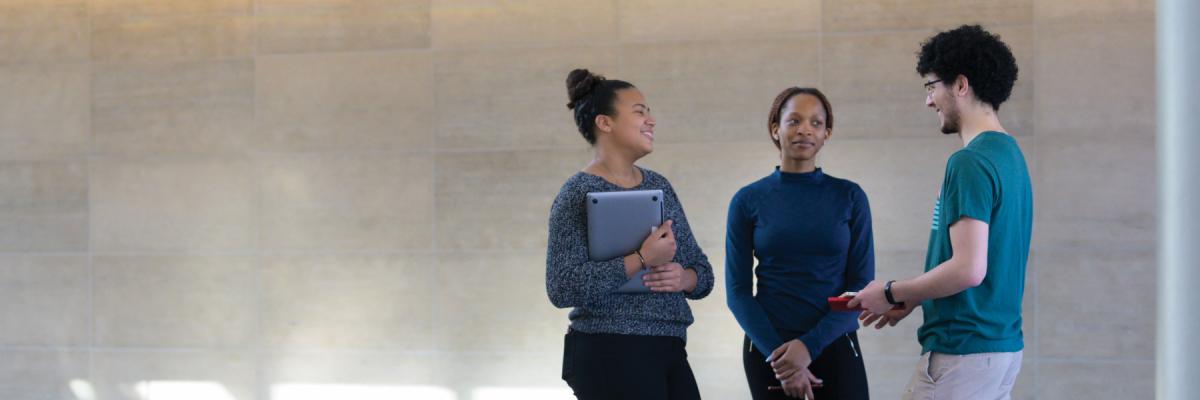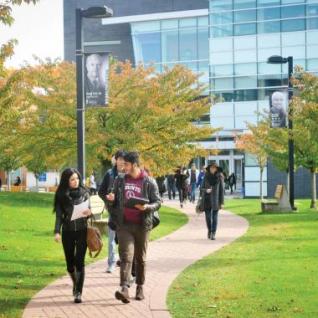African Studies Minor (HBA)
Admissions Category: Social Sciences & Humanities

Program Overview
Students in the African Studies Minor will explore African history, culture, economies, political systems and artistic expression. A study of Africa provides students with a complex and rich understanding of the most important political issues now being directly faced: environmental degradation, sharing of resources, neocolonialism, challenges faced by the nation-state, pandemics, and gender inequality. Students in this program will explore the interconnections with Europe, Asia and America; Africa’s central role in world history and processes of globalization; African, Caribbean and African-American cultural and artistic responses to modernity; racism, and liberation.
Complementary Programs:
Major or Minor Programs in International Development Studies, Political Science, History, English, Women’s and Gender Studies, Critical Migration Studies and Sociology
Check out future career opportunities and skills acquired from completing this program:
Competencies & Skills
- Understand connections between Africa’s past and present
- Critically engage with African cultures and values
- Examine selected issues in African ethnography
- Gather, review, evaluate and interpret information
- Present information and ideas clearly
- Develop interdisciplinary analytical skills
Careers for Graduates
- Activist
- Ambassador
- Charity Director
- Community Worker
- Foreign Correspondent
- Foreign Services Officer
- Government Administrator
- Historical Researcher
- Institutional Researcher
- Journalist
- Lobbyist
- Policy Advisor
- Political Advisor
Further Education
- Literature
- History
- Education
- International Development
- Political Science
- Law School
- Paralegal Studies
- Journalism
- Public Relations
Program Pathway
Year 1 | Year 2 | Year 3 | Year 4Choose Your Courses Wisely
-
Explore different kinds of courses; this will also help with fulfilling breadth requirements and electives.
-
Use Degree Explorer to plan your courses and program of interest: uoft.me/degree planning.
Develop Your Academic & Research Skills
-
Schedule an appointment with your Program Librarian for in-depth research assistance with your assignments.
-
Get writing support and develop your Academic English skills at CTL's Writing Centre.
Apply Theory to Practice
-
Attend the UTSC Faculty Mix & Mingle Fair to connect with professors and learn more about their specialties.
-
Start building your Co-Curricular Record (CCR) and search for Experiential Learning opportunities.
Become an Engaged Citizen (Locally & Globally)
-
Get involved with the International Development Studies Students’ Association (IDSSA); also explore other relevant student clubs and activities on campus.
-
Volunteer in DSL’s Alternative Reading Week program to gain experience and knowledge about social change and community development.
Plan for Your Future Career
-
Volunteer with organizations to expand your interests — check listings on CLNx (Jobs & Recruitment).
-
Attend the Get Experience Fair in September and/or register with SCSU’s Volunteer Network Program to explore opportunities.
Year 2
Choose Your Courses Wisely
- 1.0 credit from A-level, B-level, C-level and D-level courses (taken in Year 1-4 depending on level) in AFS, HIS, IDS and GAS courses (check UTSC Calendar for details).
- Use Degree Explorer and meet with your Program Advisor or Supervisor to ensure you are on track with your degree.
Develop Your Academic & Research Skills
-
Further develop your general academic skills by attending workshops offered by the Academic Advising & Career Centre (AA&CC) and Centre for Teaching & Learning (CTL).
Apply Theory to Practice
-
Get involved in relevant opportunities on and/or off campus, e.g., apply to Work Study, or other part-time and summer jobs on CLNx (Jobs & Recruitment).
Become an Engaged Citizen (Locally & Globally)
-
Check CLNx (Jobs & Recruitment) to search for Work Study or volunteer positions on campus to gain experience and to get involved.
Plan for Your Future Career
-
Considering grad school? Speak to professors and advisors early so you are on track.
-
Explore careers through the AA&CC’s Job Shadowing and In The Field programs.
Year 3
Choose Your Courses Wisely
- 2.0 credits from A-level, B-level, C-level and D-level courses (taken in Year 1-4 depending on level) in AFS, IDS, HIS, ENG, FRE, GGR, POL and WGS (check UTSC Calendar for details).
- Use Degree Explorer to ensure you are on track with your degree.
Develop Your Academic & Research Skills
Consider competing for the UTSC Library Undergraduate Research Prize or Poster Forum
Apply Theory to Practice
- Build on your skills and knowledge through relevant events offered through your department, student groups, DSL and the AA&CC.
Become an Engaged Citizen (Locally & Globally)
- Run for an elected position in the International Development Studies Students’ Association (IDSSA).
- Look into volunteering or working overseas to expand your network through International Student Centre’s (ISC) Global Learning programs.
Plan for Your Future Career
- Plan a career path with a staff member at the AA&CC.
- Check CLNx for networking events and employer information sessions to attend.
- Attend the Graduate & Professional School Fair in September.
Year 4
Choose Your Courses Wisely
-
Ensure you have fulfilled your breadth requirements.
-
Use Degree Explorer to ensure you are on track to graduate.
-
Register your “Intent to Graduate” on ACORN by the deadline.
Develop Your Academic & Research Skills
-
Apply for an Academic Travel Fund through DSL to research, present at a conference, or engage with the international academic community.
Apply Theory to Practice
-
Attend the Summer & Full-Time Job Fair in January to meet with potential employers looking to hire students for relevant summer and full-time positions.
Become an Engaged Citizen (Locally & Globally)
-
Participate in the AA&CC’s Partners in Leadership program to learn and network with an alumni mentor about transitioning to work or further education.
Plan for Your Future Career
-
Attend the AA&CC’s Get Hired job search conference in April/May.
-
Attend the Jobs for Grads orientation for a job search “crash course”; find job opportunities on CLNx.
-
Get your Personal Statement reviewed in the AA&CC.
-
Speak to your Program Advisor about applying to grad studies and get your personal statement reviewed in the AA&CC.
